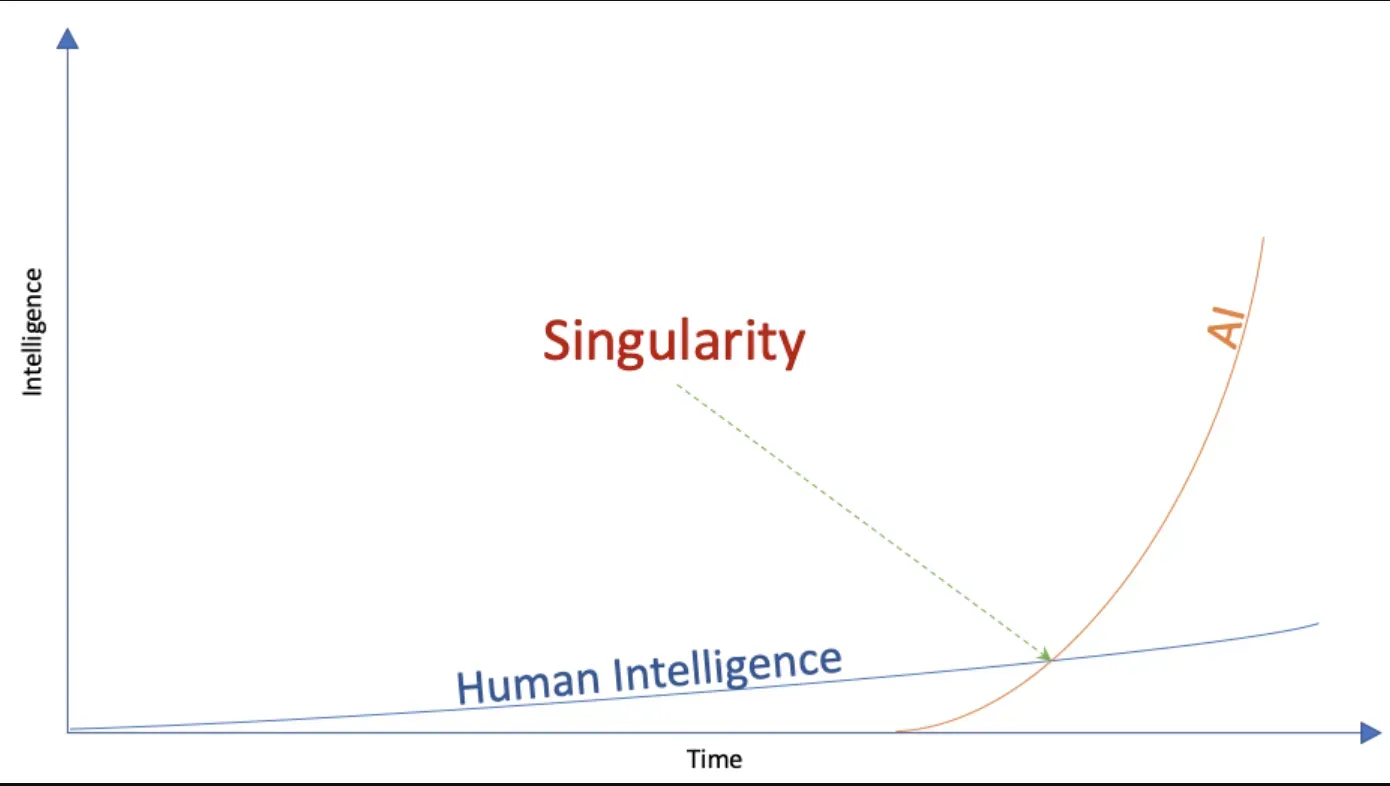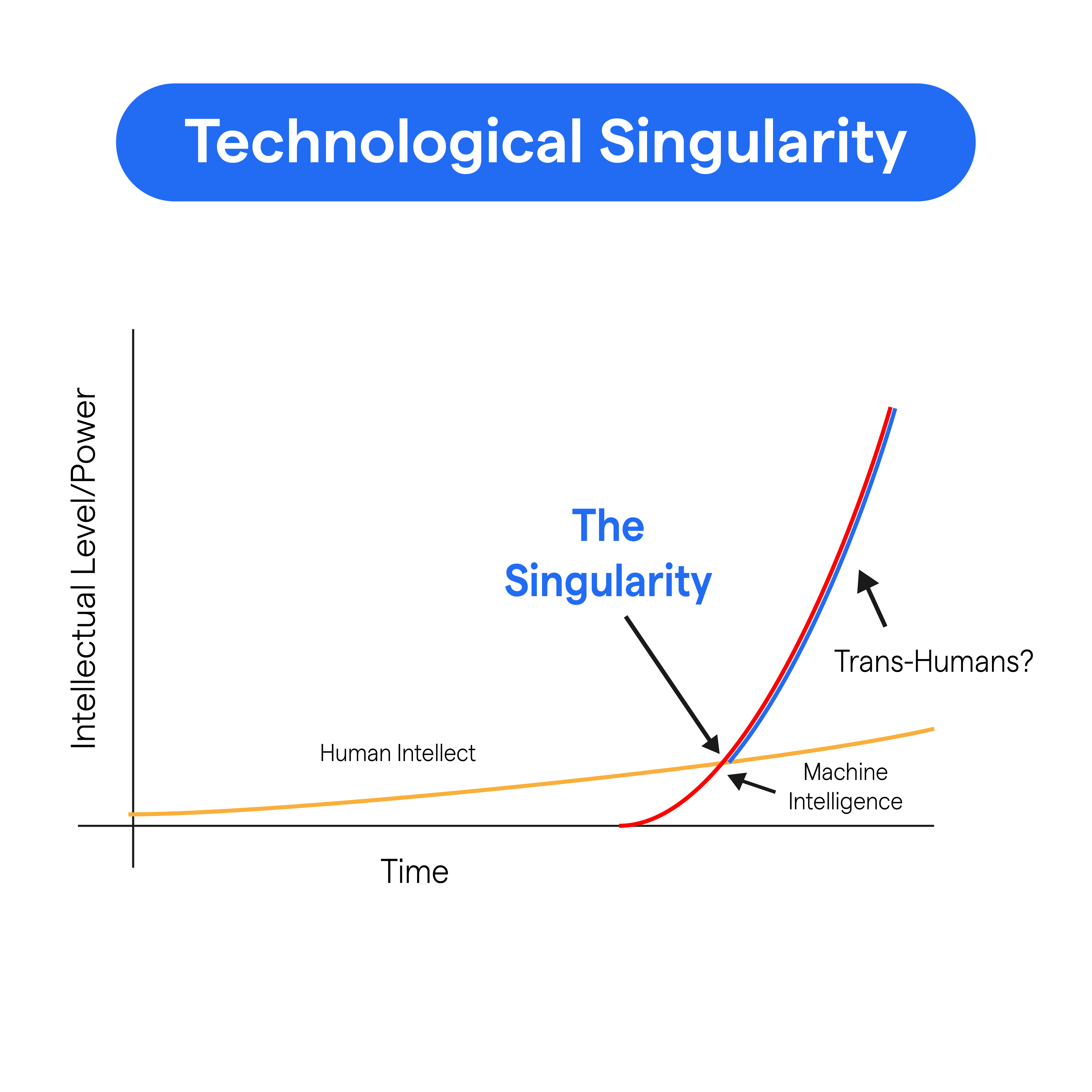What is Technological Singularity?
Technological singularity, often simply referred to as "the singularity," is a theoretical future point that will take place when technological growth becomes uncontrollable and irreversible, leading to unforeseeable changes to human civilization.
Origin of the Concept
The concept of technological singularity came into existence through science fiction, but was formalized by mathematician John von Neumann, scientists Vernor Vinge, and futurist Ray Kurzweil.
The Law of Accelerating Returns
This law, introduced by Ray Kurzweil, suggests that the rate of change in various evolutionary systems (including the economic history of technology) increases exponentially, implying that the singularity could occur in the relatively near future.
Hypothetical Timeline
Various predictions suggest different timelines for the technological singularity, with timelines varying from 20 years to over a century. The accuracy of these predictions is a matter of much debate.
Criticism and Controversy
Despite its popularity within certain circles, the concept of the technological singularity faces criticism on multiple fronts, ranging from technological feasibility to societal implications.
Why Technological Singularity
Understanding why the concept of technological singularity is crucial gives us insights into its potential implications for society, technology, and even our understanding of consciousness itself.
- Technological Growth Implications: The singularity represents a point of rapid, explosive growth where technologies like AI could significantly alter our world, reshaping everything from economies to our daily routines.
- Ethical and Moral Considerations: When machines surpass human intelligence, ethically complex situations could arise.
These could encompass issues of decision-making, consent, accountability, and, potentially, machine rights.
- Opportunity for Human Enhancement: It is speculated that the singularity might allow for human enhancement, potentially leading to forms of transhumanism.
This could involve cognitive augmentation, lifespan extension and possibly even immortality.
- Artificial Consciousness: The issue of artificial consciousness becomes critical at the singularity. If machines surpass human intelligence, would they also develop consciousness?
The implications are profound, affecting everything from AI rights to our understanding of what it means to be conscious.
- The Future of Work: Work in a post-singular world will likely be profoundly different. With superintelligent AI potentially capable of outperforming humans in most economically valuable work, the nature and concept of "work" would need to be reevaluated.
When is Technological Singularity Expected
The timelines for the singularity are a point of contention, with estimates ranging from as early as 2030 to as late as 2100 or beyond.
Kurzweil's Prediction
Futurist Ray Kurzweil predicts that the singularity will occur around the year 2045.
He presents a detailed timeline that suggests accelerating returns in various fields, highlighting trends in computing power and AI milestones.
Vinge's Prediction
Scientist Vernor Vinge estimates the singularity will happen before 2030. His estimation heavily relies on the progress in AI technology and networked intelligence.
Other Forecasts
Besides Kurzweil and Vinge, numerous other scientists, futurists, and researchers provide their own forecasts.
These broadly align with Vinge and Kurzweil's timelines, though they frequently discuss different paths to the singularity and its implications.
Skepticism about the Timeline
Many skeptics argue that the singularity may not occur within any reasonable timeframe - or at all. The plausibility of predictions hinges on many factors, including technological, societal, and ethical.
Changing Predictions and Uncertainty
The future is inherently uncertain. Predictions adjust as the technological landscape changes, and the timeline of the singularity may shift accordingly.
Who is Involved in Technological Singularity

Various individuals, fields, and organizations are involved in discussions, developments, and debates related to technological singularity.
- Singularity Thinkers: Prominent singularity thinkers include Ray Kurzweil and Vernor Vinge, who have played a significant role in shaping the concept.
Other notable figures include Elon Musk, Nick Bostrom, and Stephen Hawking.
- Tech Industry and AI Development: The tech industry at large is a significant player, developing AI capabilities that may lead us closer to the singularity.
Companies like Google, Microsoft, IBM, and Facebook invest heavily in AI research and development.
- Academic Institutions and Think-tanks: From universities to think tanks like the Future of Humanity Institute at the University of Oxford and the Machine Intelligence Research Institute (MIRI), numerous institutions research the implications of advanced AI.
- Ethicists and Philosophers: The ethical dimension of the singularity is fertile ground for ethicists and philosophers.
These individuals grapple with questions of AI rights, decision-making authority, and the moral implications of superintelligence.
- Science Fiction Writers and Futurists: Science fiction writers and futurists contribute to our understanding of the singularity by exploring its potential manifestations, societal implications, and pathways there.
How is Technological Singularity Expected to Happen
The technological singularity is not a predetermined outcome, but we can consider several possible paths to its realization.
- Advancements in AI: AI advancements will likely be a key pathway, with machines developing the ability to learn, adapt, and surpass human cognitive faculties.
- Improvement in Computational Power: The continuing increase in computational power, in line with Moore’s law, is another potential trigger for the singularity.
- Creation of Networked Intelligence: The creation of networked intelligence, where individual AIs can communicate and collaborate, could lead to collective intelligence surpassing human capabilities.
- Brain-Computer Interfaces: Brain-computer interfaces, connecting the human brain with digital devices, could potentially enable the merging of human and artificial intelligence, catalyzing the singularity.
- Discovery of New Technologies: The singularity could also be brought about by yet unknown technological breakthroughs that revolutionize our understanding and management of intelligence and consciousness.
The Implications of Technological Singularity
The singularity, if realized, would have wide-ranging implications for individuals, societies, and humanity as a whole.
- Economic and Social Structure: The massive acceleration in technological growth has the potential to revolutionize economic and societal structures, creating challenges and opportunities in fields like employment, education, and wealth distribution.
- Human Identity and Consciousness: The singularity might challenge our perception of human identity and consciousness with the potential arrival of artificial consciousness and enhanced humans.
- Evolution of Technology: The singularity represents a sort of evolutionary leap for technology, where it would no longer be reliant on human innovation but could advance on its own.
- Ethical Implications: An AI surpassing human intelligence raises multiple ethical issues. These could range from accountability of AI actions, the control problem of how we can ensure superintelligent AI act in humanity’s best interests and the possibility of AI rights.
- Existential Risks: The singularity could pose existential risks for humanity, depending on how it unfolds. If not managed properly, superintelligent AI could inadvertently cause human extinction, a risk acknowledged by researchers like Nick Bostrom.
Debates and Critiques on Technological Singularity
While technological singularity is a captivating concept, it's not without controversy and criticism.
- Feasibility of the Singularity: Critics raise questions about the feasibility of the singularity, doubting whether AI will ever truly replicate or surpass human intelligence.
- Predicted Timelines: The variety and shifting nature of the predicted timelines for the singularity leads to skepticism about the concept as a whole.
- Societal Impact: While some are optimistic about the potential societal changes, others fear that it could lead to social disruption, inequality, or even dystopian scenarios.
- Ethical Dilemmas: The ethical dilemmas posed by the singularity, such as the potential need to grant rights to machines, concern critics.
- The Control Problem: The control problem - the issue of how humans could control a superintelligent AI, is a contentious topic among critics and supporters alike.
Preparing for Technological Singularity
Whether the singularity is inevitable, possible, or improbable, it represents a collection of concepts it might be wise to prepare for.
Research and Development
Ongoing research and development in AI and associated technologies will play a key role in preparation, helping us understand potential timelines and facets of superintelligence.
Ethical Guidelines
Developing ethical guidelines for AI and considering concepts like machine ethics can help in preparing for potential moral and ethical issues that we might face.
Regulation and Oversight
Regulation and oversight of AI development, including international cooperation and standards, could mitigate risks associated with the singularity.
Public Discussion and Engagement
Promoting broad public discussion and engagement on the potential implications of the singularity can foster a societal understanding and consensus on how to navigate such an unprecedented event.
Anticipating Change and Adaptation
Accepting that change may be necessary, from how we work to how we perceive ourselves in relation to machines, is part of preparing ourselves for the possibility of the singularity.
Frequently Asked Questions (FAQs)
How does Technological Singularity relate to AI?
Technological Singularity refers to a hypothetical point where AI machines surpass human intelligence. At this point, AI systems could self-improve, innovate, and impact society profoundly, making the future post-singularity unpredictable.
What's the role of Moore's Law in Technological Singularity?
Moore's Law, stating that computer power doubles approximately every two years, hints towards eventually reaching singularity.
If this trend continues, exponential technological growth could lead to AI evolving beyond human intellect.
Can Technological Singularity affect economic systems?
Potentially yes. If AI systems surpass human intelligence, they could outperform humans in most economically valuable work, disrupting labor markets, income distribution, and economic structures.
What's the "Intelligence Explosion" in relation to Technological Singularity?
Intelligence Explosion refers to AI systems recursively improving themselves, leading to rapid advancements in a short time.
The explosion could trigger the singularity, creating superintelligence that could shape the future unpredictably.
Is there a predicted timeline for reaching Technological Singularity?
Estimates vary widely, with some projecting its arrival within a few decades while others argue it's centuries away or may never occur.
Determining an exact timeline is challenging due to the speculative nature of Technological Singularity.

